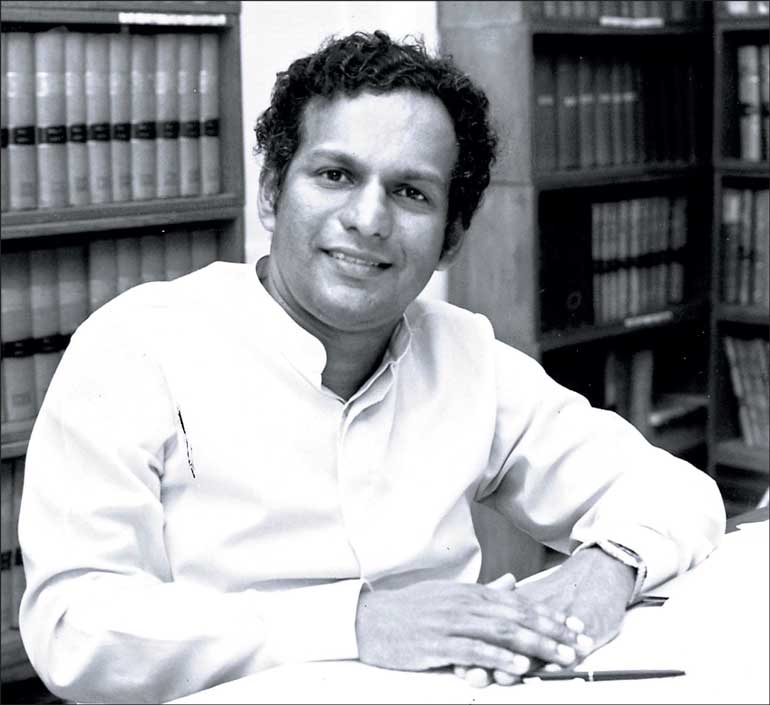Wednesday Feb 18, 2026
Wednesday Feb 18, 2026
Friday, 8 August 2025 00:30 - - {{hitsCtrl.values.hits}}

Neelan Tiruchelvam
 The life, and violent death, of Neelan Tiruchelvam is the subject of a new documentary by young Canadian Tamil director Pitasanna Shanmugathas. Its title is apt. In life Tiruchelvam was silenced in July 1999 by the LTTE suicide bomber who threw himself onto the eminent Sri Lankan Tamil lawyer turned politician’s car close to his Colombo office.
The life, and violent death, of Neelan Tiruchelvam is the subject of a new documentary by young Canadian Tamil director Pitasanna Shanmugathas. Its title is apt. In life Tiruchelvam was silenced in July 1999 by the LTTE suicide bomber who threw himself onto the eminent Sri Lankan Tamil lawyer turned politician’s car close to his Colombo office.
Both before and since that grimly characteristic Tiger response to opponents, real and imagined, Shanmugathan suggests, there have been other silences around Tiruchelvam. During his life, resolute espousal of a pluralistic, equity-based approach to resolving Sri Lanka’s ethnic conflict won Tiruchelvam’s many friends but also plenty of enemies, and on both sides of the ethnic divide.
Partly as a result, it was only really later in life that Tiruchelvam’s voice began to gain a wider audience, notably within official Sri Lankan and international human rights circles – the latter via a combination of academic connections with Harvard University, and political links to organisations such as the US National Democratic Institute (NDI), a number of whose international election observation missions he participated.
An absorbing story
All in all, for anyone with an interest in modern Sri Lankan history, in particular the ethnic conflict, this documentary offers an absorbing story. Starting with Tiruchelvam’s father, himself a noted politician during an earlier stage of Tamil attempts to respond to overarching Sinhala majoritarianism in the aftermath of independence, it goes on to chart his progress from gifted law student to the higher echelons of academia, human rights activism and the national political arena.
Shanmugathas’ documentary is too long: running at nearly 2.5 hours, in an increasingly short-attention span era it is likely to tax the attentions of anyone but the most dedicated viewer. There are a few technical glitches too – some abrupt cuts, the occasional, presumably interviewer’s voice speaking off mike in the background. And for all their inherent interest, some sections, notably those touching on Tiruchelvam’s father and his son’s engagement with NDI could profitably have been reduced in length.
These quibbles aside, this is an absorbing and well-conceived documentary that brings together an extensive range of Tamil and Sinhala voices – including, I was pleased to note, a prominent Tamil critic of Tiruchelvam. Indeed, in the interests of overall balance Shanmugathas could usefully have included more such voices. The strongest section is the one dealing with Tiruchelvam’s role in the formulation of Chandrika Kumaratunga’s 1995 ‘Union of the Regions’ constitutional reform proposals, by common consent the most radical and far-reaching effort so far to outline a political proposal aimed at addressing critical issues underlying the ethnic conflict.
Central role in formulating Kumaratunga proposals
 Tiruchelvam comes to the fore here because he is depicted – rightly – as having played a, if not the central role in formulating the Kumaratunga proposals, which centred on replacing a constitutional formula defining the country as a ‘unitary state’ with a federalist-type provision for recasting it as a ‘Union of Regions’.
Tiruchelvam comes to the fore here because he is depicted – rightly – as having played a, if not the central role in formulating the Kumaratunga proposals, which centred on replacing a constitutional formula defining the country as a ‘unitary state’ with a federalist-type provision for recasting it as a ‘Union of Regions’.
To Tiruchelvam’s eternal chagrin the proposals were eventually withdrawn in the face of determined criticism from the opposition UNP, led by a youngish Ranil Wickremesinghe, with the massed ranks of Sinhala nationalists utterly opposed to any suggestion of constitutional dilution, let alone perceived treachery, providing the chorus. Equally important, as the documentary highlights, was the LTTE’s response to the proposals, namely: silence.
This political omerta effectively pulled the rug out from under Kumaratunga’s attempt to build a cross-ethnic constituency in support of her reform proposals. Among the critics of the LTTE’s studied silence, it is poignant to hear Kumaratunga’s onetime Foreign Minister, Lakshman Kadirgamar – also later assassinated by the LTTE – lambasting the Tiger’s silence in characteristically eloquent fashion.
In the end, it took Kumaratunga another five years to table a fresh set of reform proposals, in 2000, proposals that were eventually watered down significantly in response to renewed political pressure from the Sinhala nationalist lobby. Following their tabling in autumn 2000, the UNP went so far as to burn a copy in protest inside parliament, while the LTTE simply rejected them out of hand.
More on process than actual content
The most intriguing commentary on this episode, however, is provided by Norwegian ex-Sri Lanka peace facilitator Erik Solheim. Based on his experiences of dealing with the LTTE leadership during the peace talks of the early 2000s, Solheim suggests that the Government’s biggest mistake with the 1995 ‘Union of the Regions’ proposal centred more on process than their actual content.
Specifically, Solheim suggests that for all their habitual political bluster, the Tiger leadership – supremo Velupillai Prabhakaran in particular – were highly sensitive to how they felt they were being treated by Sri Lankan officialdom. In this instance, he claims, Kumaratunga’s proposals were never formally communicated to the Tigers: allegedly, Prabhakaran only got to know of their contents via other, informal channels, this perceived slight leading him to maintain silent protest in response. When the Tigers expected formal, diplomatic-style treatment in line with their self-perceived status, and didn’t get it, they reacted strongly to what they perceived as the Government’s studied nonchalance – intended or otherwise – towards them. As the old song has it, ‘it ain’t what you do, it’s the way that you do it’.
Whether Solheim is right here is a matter for discussion – a discussion that would be greatly assisted were any of the LTTE leadership still alive to tell the story from their viewpoint. But they aren’t, leaving us to look to secondary sources to try and help us piece together this particular puzzle. In a related context, too, any researcher able to unearth any hard evidence of what the Tigers really thought about Tiruchelvam – and indeed, the constitutional reform proposals he engineered – beyond the label of ‘traitor’ habitually heaped on him by Tamil nationalists would be rendering genuine service.
This, together with the voice of other critics of Tiruchelvam’s politics, is something Shanmugathas’ documentary could usefully have explored further. A similar point applies to his assassination, which is only covered in outline. Who exactly ordered his killing, and who carried it out? How was it set up? And how much contact did Tiruchelvam have with the Tigers in the run-up to his death or indeed previously (we’re told he received a warning some weeks earlier – from who?). Without dwelling on his assassination’s gory details, these are questions it would have been useful to see the documentary address.
None of these caveats fundamentally detracts, however, from this documentary’s essential qualities. Overall, it provides a fitting, well-presented tribute to one of the most honourable, important, if often neglected figures in modern Sri Lankan history.
Neelan: Unsilenced is available for viewing at www.neelanunsilenced.com.
(The author is a writer and consultant. He is author of To End A civil War: Norway’s Peace Diplomacy in Sri Lanka (2015) and From Independence to Aragalaya: A Modern Political History of Sri Lanka (forthcoming).)